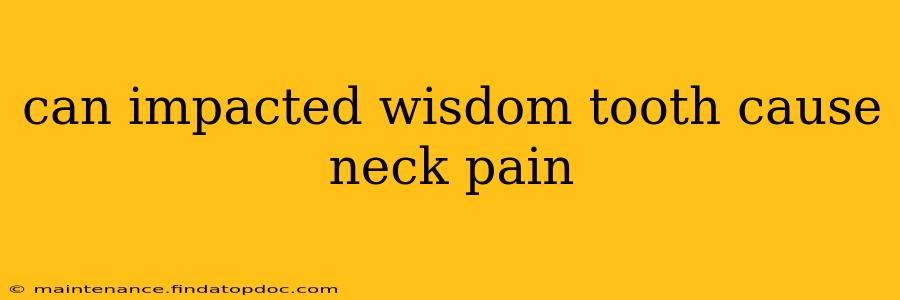Yes, an impacted wisdom tooth can potentially cause neck pain, although it's not a direct or immediate cause in most cases. The connection is often indirect and arises from the inflammation and complications associated with an impacted wisdom tooth. This article explores the possible links between impacted wisdom teeth and neck pain, addressing common questions surrounding this issue.
How Can an Impacted Wisdom Tooth Lead to Neck Pain?
The pain isn't transmitted directly from the tooth to the neck. Instead, the pain is often a consequence of the following:
-
Referred Pain: Pain from an impacted wisdom tooth can sometimes be felt in other areas of the body, a phenomenon known as referred pain. The nerves in the jaw and neck are interconnected, and pain signals originating from the tooth might be misinterpreted by the brain as originating from the neck. This is more likely if the impacted tooth is causing significant inflammation or infection.
-
Muscle Tension and Postural Changes: Severe pain from an impacted wisdom tooth can lead to muscle tension in the jaw and neck as you unconsciously try to compensate for the discomfort. This can manifest as persistent neck pain, headaches, and even stiffness. Furthermore, discomfort might alter your posture, leading to further muscle strain and pain.
-
Infection (Pericoronitis): An impacted wisdom tooth is prone to infection, a condition called pericoronitis. This infection can spread, causing swelling and inflammation that impacts surrounding tissues, potentially leading to pain radiating towards the neck and even causing a fever.
-
TMJ Dysfunction: The temporomandibular joint (TMJ) connects your jaw to your skull. An impacted wisdom tooth, especially one causing significant inflammation, can disrupt the function of the TMJ, resulting in pain in the jaw, ear, and neck.
What Other Symptoms Might Accompany Neck Pain from an Impacted Wisdom Tooth?
Several other symptoms might accompany neck pain if it's related to an impacted wisdom tooth:
- Jaw Pain: This is a common and often more prominent symptom than neck pain. The pain might be localized to the area of the impacted tooth or spread across the jaw.
- Headache: Headaches, particularly those located on one side of the head, often accompany pain originating from impacted wisdom teeth.
- Earache: Pain in the ear, usually on the same side as the impacted wisdom tooth, is another possible symptom.
- Swelling: Swelling of the gum tissue around the impacted wisdom tooth is common, and it might also spread to the jaw and face.
- Difficulty Opening Your Mouth: This is a sign of significant inflammation or infection.
- Bad Breath: An infected impacted wisdom tooth can cause bad breath due to bacterial growth.
- Fever: A high fever suggests an infection that may require immediate medical attention.
How Can I Tell If My Neck Pain Is Related to My Wisdom Tooth?
It's crucial to consult a dentist or oral surgeon to determine the cause of your neck pain. They can examine your mouth, assess the impacted wisdom tooth, and conduct necessary tests like X-rays to confirm the diagnosis. Don't rely solely on self-diagnosis, as many conditions can cause neck pain. The dentist can also rule out other potential causes, such as muscle strain, arthritis, or other dental problems.
When Should I See a Dentist or Oral Surgeon?
Seek immediate dental attention if you experience any of the following:
- Severe pain in your jaw, neck, or ear.
- Swelling in your face or jaw.
- Difficulty opening your mouth.
- A high fever.
- Signs of infection (pus or redness).
Delayed treatment can lead to serious complications, so timely intervention is essential.
Can Removing the Impacted Wisdom Tooth Relieve Neck Pain?
In many cases, removing the impacted wisdom tooth can resolve the associated neck pain. Once the source of inflammation and infection is eliminated, the referred pain and muscle tension will often subside. However, this isn't always a guarantee, and complete pain resolution may take some time even after the surgery.
Is Neck Pain Always a Sign of a Problem with Wisdom Teeth?
No, neck pain is not always a sign of a problem with wisdom teeth. Many other factors can cause neck pain, including muscle strain, poor posture, arthritis, and injuries. It’s important to have a comprehensive evaluation by a healthcare professional to accurately identify the cause of your pain.
This information is for general knowledge and does not constitute medical advice. Always consult with a qualified healthcare professional for any health concerns or before making any decisions related to your health or treatment.
